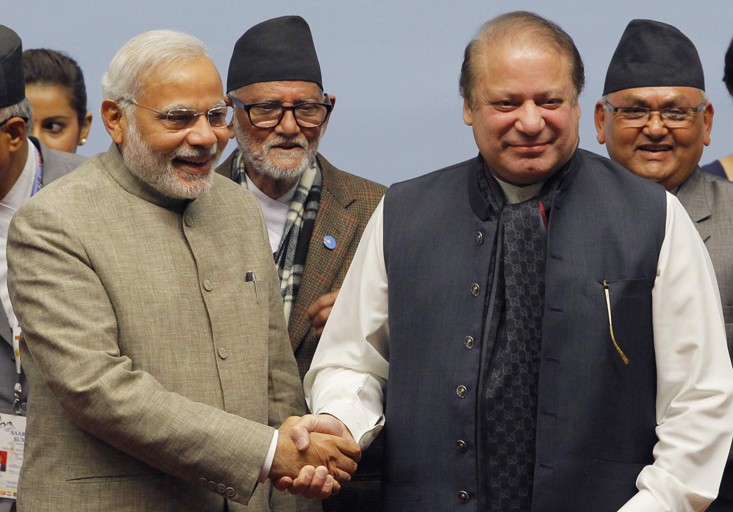
Modi's speech and the debate it has sparked in both countries

Pakistan and India. Three wars. Countless covert (and occasionally overt) operations. Rampant spying. All the ingredients for an action-packed big screen thriller. Yet both Islamabad and New Delhi always fail to deliver the goods. Instead, we’re left squabbling over the same matters, over and over again. You say terror, I say Kashmir. RAW. ISI. Indus. Siachen.
But this time, according to the Pakistanis, the Indians have gone one accusation too far. Usually, New Delhi, as a policy, washes its hands clean over frequent Pakistani allegations of its role in the unrest in Balochistan. So, for the Indian Prime Minister to come out and say that "people of Balochistan, Gilgit and Pakistan Occupied Kashmir have thanked me a lot in the past few days," is quite surprising.
While the statement has sparked a debate within the Indian press on whether this is the first or second time that their government has mentioned Balochistan, it has, as usual caught Pakistan, scrambling for shelter.
The key though is timing and motive. Two vital components of politics. The statement comes at a time when India is under pressure both domestically, and internationally, for its terrible handling of the latest unrest in the occupied valley of Kashmir.
"This statement, really, is because he (Modi) doesn’t have any immediate solution to what’s happening in the valley,’ says Moeed Yusuf, a foreign policy expert based in Washington D.C. "Instead, he’s pushing into domains where the world is more receptive to what you have to say, hence Balochistan."
Islamabad has responded, like it always does, by saying that the remarks "prove Pakistan’s contention that India, through its main intelligence agency Research and Analysis Wing, has been fomenting terrorism in Balochistan" -- the same old song and dance.
But the focus on Kashmir is lost. And that primarily is what Modi needed. 1-0. While Pakistan now rushes to quell the Balochistan fire it gives New Delhi precious time to do what it can, to quieten the unrest in Kashmir.
Internationally, this puts the Pakistani Prime Minister in a delicate position. He needs to keep the pressure up regarding Indian excesses in the occupied valley while trying to underscore the unrest in Balochistan. The question really is, is our PM that good a juggler?
Read also: Start talking again
"Pakistan has reacted very amateurishly to Modi’s comments," says Dr Mohammad Waseem, Professor of Political Science at the Lahore University of Management Sciences. "Instead of the protests on the streets of Quetta, the wiser play would have been to deal with the matter diplomatically."
After all, Balochistan is not a disputed territory. The separatists are not running away with the narrative there, and the nationalists are themselves heavily divided. "What Nawaz Sharif needed to do, was press harder on Kashmir," says Mosharraf Zaidi, former advisor to the foreign office. "And to shut down irritants like Hafiz Saeed, but that would require a massive amount of willingness."
In any event, the Professor feels that Nawaz Sharif abandoned any plans for peace with India, sometime in 2013, giving in to pressure from the establishment.
Since then, the Pakistan India relationship has largely been controlled and dictated by the Indians.
Much and more has been written about how peace between Pakistan and India would be mutually beneficial. For India, it remains a major obstacle in its becoming a player on the world stage. For Pakistan, it opens up massive economic benefits -- like those gained by Canada and its relationship with the United States.
Read also: Editorial
And the world at large also ‘needs’ a stable Pakistan. Yet, Yusuf feels that peace between these two countries is no longer a compulsion, at least not from the Indian side, because of the differential between the two countries, "There’s a clear sense (from the Indians) that we’re happy to talk to you, if you meet us 90 per cent of the way." For the Pakistanis, and one’s not sure if they see it this way, but ‘‘if you want to interest the world rather than worry it, you need to unlock your neighbourhood’s economic potential."
That can only happen if some semblance of peace is achieved between the two countries. It is, in this imbalance, that India has rejected Pakistan’s offer to talk on Kashmir, saying it will only discuss the matter of terrorism. This insistence, albeit unfair, is from a position of strength and strikes the right chords internationally.
"It’s not a matter of what’s on top or bottom, it’s neither Kashmir nor terrorism," says Yusuf. "The only way out, is composite dialogue." That’s not on the table anymore. This hurts Pakistan more than anybody else. As this is something the world wants Pakistan to deal with as well. 2-0 India.
All eyes are now on the United Nations General Assembly scheduled for mid September. A fair amount of grandstanding can be expected from both sides, with Pakistan leading the Kashmir cause. Later is the SAARC summit, to be held in Islamabad and Murree. Barring any misadventures, such as Pathankot and/or Mumbai, these two international events will dictate how the relationship between Islamabad and New Delhi unfolds.
To analysts, there is no doubt that Prime Minister Nawaz Sharif has the personal skills and the troupe required to mend the relationship with the Indians. It is merely a question of will. Considering the costs involved, does he even want to? Or more importantly, will he be allowed to?
According to Yusuf, all that’s happening today is merely a game of narratives and positioning, "nothing has changed on the ground, not in Kashmir nor in Balochistan, it’s just narratives and perceptions."
And unless Pakistan pulls a fast one quickly, it’s 3-0 New Delhi.